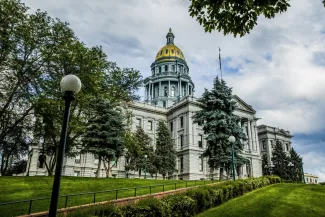
Colorado Legislature approves bills to sell tax credits in special session
© iStock - Ligorko
Two tax credit bills from the special legislative session are headed to Governor Jared Polis’ desk after gaining approval from Colorado lawmakers Tuesday. The bills would both allow the state’s treasury department to sell state tax credits in order to raise revenue for the current fiscal year, with one sending money to the general fund and the other funding programs to lower health insurance premiums.
Large taxpayers would be able to buy credits for future tax liability at a lower rate, so the state would get that money now and the payer would benefit from the discount.

© fotoguy22 - iStock - 1468912821
The Legislature began its special session last Thursday to lessen the blow of an approximately $750 million gap in the state’s budget, spurred by tax code changes in the recent federal Republican tax break and spending cut law. Several revenue-raising bills already passed the Legislature Monday.
The first of the two tax credit bills, House Bill 25B-1004, was approved by the Senate Tuesday in a mostly party-line vote. The bill would sell up to $125 million of insurance premium tax credits and corporate income tax credits for the current fiscal year, allowing qualifying companies to pay certain state taxes early at a discount. The money raised, which could be up to $100 million, would go to the state’s general fund, which pays for a wide range of basic services including education, health care and public safety.
Senator Janice Marchman, a Loveland Democrat, voiced support for the bill during final Senate debate, and said it is necessary to help fill the state budget hole.
“(This bill) is a practical and disciplined bridge,” Marchman said. “It protects district funding and essential local services now, while we take up the structural work to make Colorado’s tax code stable for the long run.”
But Senate Republicans said the Legislature should be focused on cutting costs, not selling tax credits that could hurt state revenue down the line.
“It could possibly help fill the gap this year, but it causes problems in the out year,” said Senator Barbara Kirkmeyer, a Brighton Republican who sits on the Joint Budget Committee. “That’s why I’m saying that it doesn’t necessarily fix our budget. It may help with the gap in the short term, but it just pushes out, kicks the can down the road, if you will, into the next years.”

© zimmytws - iStock-511889079
The Senate then approved House Bill 25B-1006, which would sell tax credits to bring in money for the Health Insurance Affordability Enterprise fund. That pays for programs to reduce individual insurance market premiums.
The bill aims to raise $100 million for that enterprise to soften the impact of the expiration of federal enhanced premium tax credits. Health insurance premiums for people who buy insurance on the individual market are expected to face an average of a 28 percent increase next year, with higher increases along the Western Slope.
HIAE funds the state’s reinsurance for claims from high-cost individuals, subsidies for carriers on the state’s health insurance exchange and the state’s OmniSalud program for people without permanent legal status.
It is possible Congress will extend or partially restore the federal enhanced premium tax credit in question, in which case the sale of tax credits proposed in the bill would not occur.
The bill originally borrowed the money from the state’s Unclaimed Property Fund. The funding mechanism was amended in its Senate committee.
Several Senate Republicans warned about overreliance on the sale of tax credits, and raised concerns that the credits wouldn’t all be sold. Democrats said the bill will help vulnerable Coloradans, though some argued that the bill does not do enough.
Senator Iman Jodeh, an Aurora Democrat who sponsored the bill, said she fears for people whose health care premiums will increase, and urged lawmakers to pass the bill as a way to ease that burden.
“What happened in July (with the federal law) is about to be catastrophic for Colorado,” Jodeh said. “I refuse to stand before my constituents, before anyone in Colorado, and face any kind of moral reckoning because we did nothing, because we chose to make it political, because we couldn’t find a funding source that pleased everyone.”
After the Senate passed HB25B-1006, the House agreed with the Senate amendments. It now heads to the governor’s desk.
















